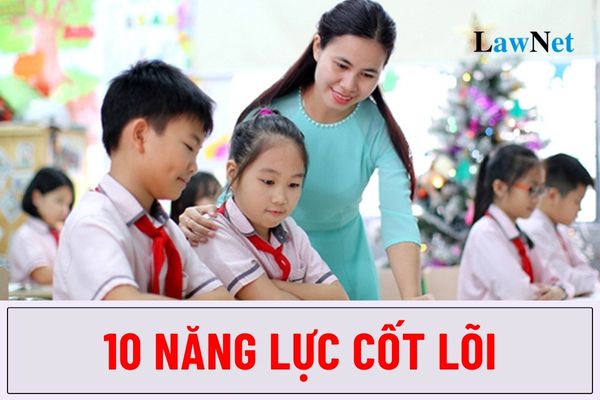Vietnam: What are the 10 core competencies of primary school students according to the 2018 General Education Program?
What is a student's core competency in Vietnam?
Under Subsection 1 of Section 9 of the general education program issued together with Circular 32/2018/TT-BGDDT:
Explanation of Terms
In the general education program, the following terms are understood as follows:
...
l) Competency: an individual's attribute formed and developed thanks to inherent qualities and the process of learning and training, allowing the individual to aggregate knowledge, skills, and other personal attributes such as interest, belief, will, etc., to successfully perform a specific type of activity and achieve desired results under certain conditions.
m) Core Competency: a basic, essential competency that anyone needs to have to live, study, and work effectively.
n) Talent: special competencies in intellectual, artistic, sports, life skills, etc., thanks to the inherent qualities in each individual.
o) Quality: good qualities shown in attitudes and behaviors of individuals; along with competency, it forms a person's character.
Core competency is defined as the basic, essential competency that anyone needs to have to live, study, and work effectively.

What are the 10 core competencies of primary school students according to the 2018 general education program in Vietnam? (Image from the Internet)
What are the 10 core competencies of primary school students according to the 2018 general education program in Vietnam?
Under the regulations in the general education program issued together with Circular 32/2018/TT-BGDDT, the 10 core competencies of primary school students are clearly defined as follows:
- 03 General Competencies of Students:
+ Self-control and Self-study
+ Communication and Cooperation
+ Problem-solving and Creativity
- 07 Specific Competencies of Students:
+ Language Competency
+ Calculation Competency
+ Scientific Competency
+ Technological Competency
+ Informatics Competency
+ Aesthetic Competency
+ Physical Competency
What are the required outcomes for 03 general competencies of primary school students in Vietnam?
According to Section 9 of the general education program issued together with Circular 32/2018/TT-BGDDT, the required outcomes for 03 general competencies of primary school students in Vietnam are as follows:
| Competency | Primary Level |
| --- | --- |
| Self-control and Self-study | |
| Self-reliance |
Be able to do their own tasks at home and school as per allocation and instruction. |
| Self-assertion and Protection of Legitimate Rights and Needs |
Be conscious of their rights and personal wishes; initially able to present and perform some legitimate rights and needs. |
| Self-regulation of Emotions, Attitudes, and Behaviors |
- Recognize and express their emotions and feelings; know how to share their emotions and feelings with others. - Be courteous with everyone; do not say or do things that offend others. - Follow the study and labor plan; avoid playing to the extent of affecting study and other tasks. |
| Adaptation to Life |
- Find different ways to solve the same problem. - Perform different tasks with various requirements. |
| Career Orientation |
- Exhibit personal interests and abilities. - Know names, main activities, and roles of some occupations; relate that knowledge to the occupations of family members. |
| Self-study and Self-improvement |
- Have a sense of summarizing and presenting learned knowledge. - Recognize and correct mistakes in tests based on teachers' comments. - Have a sense of following good role models. |
| Communication and Cooperation | |
| Determining Purpose, Content, Means, and Attitude of Communication |
- Recognize the importance of communication in meeting personal needs. - Receive texts on life, nature, and society that use language combined with images like comics, simple writings. - Initially know how to use language combined with images and gestures to present information and ideas. - Pay attention when communicating; recognize the attitude of the communication object. |
| Establishing and developing Social Relationships; Resolving and Mitigating Conflicts |
- Know how to make and maintain friendships. - Recognize disagreements and conflicts between self and friends or among friends; know how to yield to or persuade friends. |
| Determining Purpose and Method of Cooperation |
Have the habit of exchanging and helping each other in studying; know how to complete study tasks together as instructed by teachers. |
| Determining Responsibilities and Activities of Self in Group |
Understand the group's tasks and identify their responsibilities and activities within the group after being guided and assigned. |
| Identifying the Needs and Abilities of Collaborators |
Recognize some prominent features of group members to propose an appropriate task allocation plan. |
| Organizing and Persuading Others |
Know how to strive to complete assigned tasks and share in helping other members complete their assignments. |
| Evaluating Collaborative Activities |
Be able to report the group's task completion results; self-assess strengths and weaknesses under teachers' guidance. |
| International Integration |
- Have initial knowledge about some countries in the region and the world. - Participate in some international integration activities as guided by the school. |
| Problem-solving and Creativity | |
| Recognizing New Ideas |
Be able to identify and clarify new information and ideas from given sources as guided. |
| Identifying and Clarifying Issues |
Be able to collect information from situations, recognize simple issues, and ask questions. |
| Forming and Implementing New Ideas |
Based on existing understanding, know how to form new ideas and predict outcomes when executed. |
| Proposing and Choosing Solutions | State ways to solve simple problems as guided. |
| Designing and Organizing Activities |
- Identify major content and ways to achieve set goals as guided. - Comment on the significance of activities. |
| Independent Thinking |
Raise questions about surrounding objects and phenomena; not hesitate to express personal opinions on different information about objects and phenomena; ready to change upon recognizing errors. |

